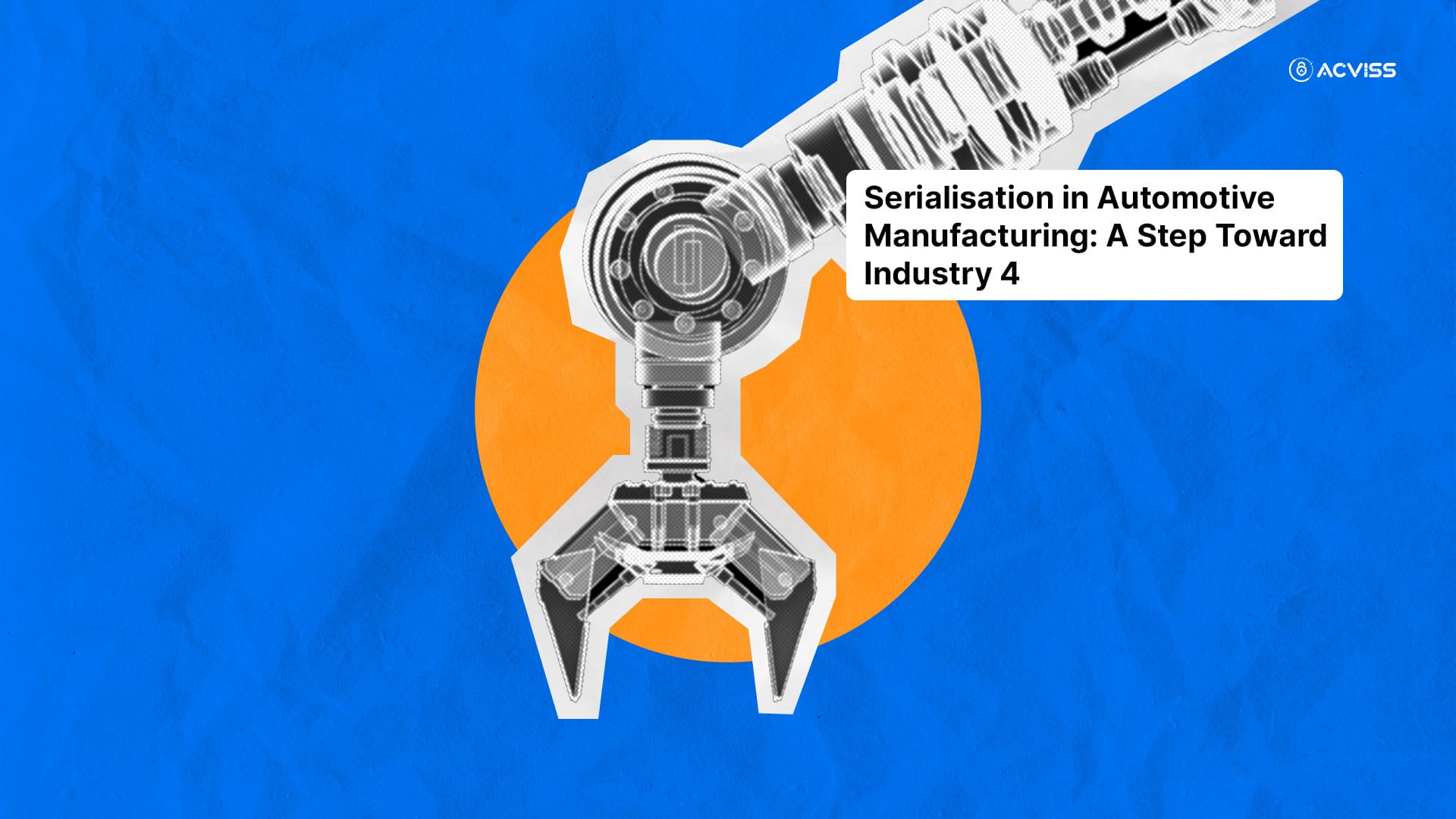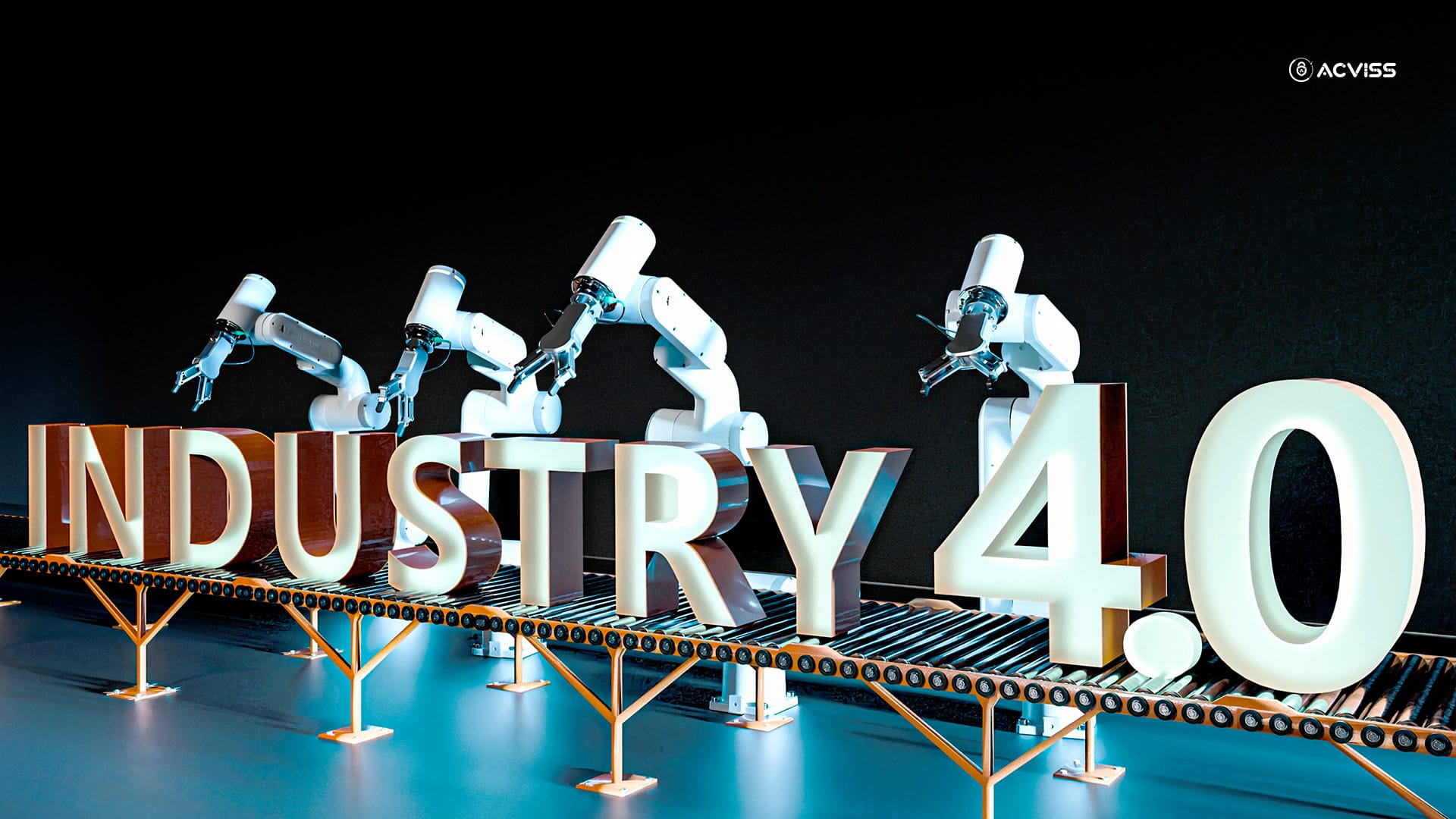Serialisation in Automotive Manufacturing: A Step Toward Industry 4

The automotive industry has long been at the forefront of innovation. From the moving assembly line pioneered by Henry Ford to the adoption of robotics and automation in the 1980s, every leap has reshaped how vehicles are designed, manufactured, and distributed. Today, the industry faces yet another turning point, one defined not just by technology but also by the urgent need for security, trust, and efficiency. That turning point is serialisation.
Often overlooked outside the pharmaceutical and FMCG sectors, serialisation in automotive manufacturing is fast becoming the backbone of Industry 4.0, where connected systems, data-driven insights, and digital-first processes drive competitive advantage. It is more than just stamping a number on a part; it is about creating a digital DNA for every component, ensuring it can be traced, verified, and authenticated at every stage of the supply chain.
This blog explores why serialisation matters in automotive manufacturing, how it ties into larger movements like Industry 4.0, and the role of brand protection and traceability solutions in safeguarding both manufacturers and customers.
Why the Automotive Industry Needs Serialisation
The global automotive supply chain is one of the most complex in the world. A single vehicle can contain anywhere between 20,000 and 30,000 individual parts, sourced from hundreds of suppliers spread across different continents. Managing this intricate web is already challenging, but the rise of counterfeiting, grey market diversion, and evolving regulatory requirements makes it even more pressing.
Counterfeit automotive parts alone form a billion-dollar problem. According to the OECD, the trade in fake automotive parts accounts for nearly 3% of global trade in vehicle components, and the consequences are dire. Unlike counterfeit handbags or apparel, a fake brake pad, tyre, or airbag directly endangers human lives.
Serialisation offers a direct solution by enabling:
- Product traceability: Every component is uniquely identified, making it easier to track and trace across the supply chain.
- Brand protection: Serialised identifiers deter counterfeiters by creating secure product verification mechanisms.
- Compliance: As governments and industry bodies tighten regulations on quality, emissions, and sustainability, serialisation ensures transparency and accountability.
For manufacturers, serialisation is not just a defensive measure; it is a competitive advantage. It provides the confidence to manage recalls with precision, build customer trust with transparent product authentication, and gain real-time insights into supply chain management.
Serialisation and Industry 4.0: The Bigger Picture

Industry 4.0 is about convergence. It connects machines, data, and processes into an intelligent ecosystem. Serialisation acts as a crucial bridge in this transformation.
Digital Twins and Product DNA
Each serialised component becomes part of a digital twin – a virtual representation that carries information about its origin, material composition, manufacturing process, and even lifecycle history. This digital DNA is the bedrock of predictive maintenance, AI-driven quality control, and intelligent resource planning.
Smart Supply Chain Management
A serialised supply chain enables true track and trace capabilities. Instead of viewing logistics as a linear chain, companies gain a web of interconnected data points. This ensures complete visibility, reduces bottlenecks, and allows for agile responses to disruptions, whether they arise from geopolitical tensions, raw material shortages, or natural disasters.
Integration with IoT and Blockchain
The full potential of serialisation is realised when it integrates with other technologies. IoT sensors can feed data tied to serialised identifiers, tracking everything from temperature during transport to vibration in storage. Blockchain ensures that this data remains immutable and tamper-proof, creating a trusted ledger of every transaction and transfer.
In short, serialisation is the glue that allows disparate Industry 4.0 technologies to function cohesively.
The Dark Side: Counterfeiting in Automotive
Before diving deeper into solutions, it is worth understanding the gravity of the counterfeit problem in the automotive industry.
- Scale: The Automotive Aftermarket Suppliers Association (AASA) estimates that counterfeit parts cost the global automotive industry over US$45 billion annually.
- Risk: Counterfeit airbags and brake pads have been linked to multiple road fatalities worldwide. Even less critical components like filters or spark plugs can reduce performance, increase emissions, and erode brand trust.
- Distribution: Online marketplaces and grey distributors fuel the spread of counterfeit automotive parts, exploiting gaps in brand authentication and product verification.
For manufacturers, this is not merely a financial issue but also one of brand verification and IP protection. Allowing counterfeit goods to infiltrate the market undermines decades of investment in quality, engineering, and customer relationships.
How Serialisation Strengthens Brand Protection

Serialisation directly addresses counterfeiting by creating a unique, non-cloneable identity for each part. Unlike simple barcodes or QR codes, modern serialisation technologies go further by incorporating security features that cannot be copied or duplicated.
Product Authentication
When customers or distributors scan a serialised identifier, they should instantly verify whether the product is genuine. Advanced solutions like Acviss Certify enable this by generating non-cloneable codes that cannot be replicated. This ensures accurate product authentication at every point of sale.
Track and Trace Capabilities
serialisation enables end-to-end visibility. By integrating Acviss Yellow Code, brands can assign unique codes at the component level, enabling them to trace the part through manufacturing, warehousing, and distribution. This makes it much harder for counterfeit products to infiltrate the legitimate supply chain.
Customer Engagement
Beyond verification, serialised identifiers can open a direct communication channel with customers. When a buyer scans a part, they not only confirm authenticity but also access product information, warranty details, or loyalty programmes. This deepens engagement and adds a layer of brand protection by strengthening consumer trust.
Implementing serialisation in Automotive Manufacturing
While the benefits are clear, implementing serialisation in automotive manufacturing is a complex undertaking. It requires coordination across suppliers, production units, distributors, and regulatory frameworks.
Defining the Scope
The first step is to determine at what level serialisation should occur. For some brands, it may start at the component level (e.g., brake pads, spark plugs). Others may extend it to sub-assemblies (e.g., engines, gearboxes) or even the entire vehicle.
Choosing the Right Technology
Not all serialisation methods are created equal. Traditional barcodes or QR codes are a starting point, but they are vulnerable to cloning. Advanced solutions such as non-cloneable codes and digital watermarks offer stronger IP protection.
Integration with Manufacturing Systems
To deliver value, serialisation needs to be integrated with ERP, MES, and SCM platforms. This ensures that serialised data flows seamlessly across procurement, production, inventory management, and logistics.
Training and Change Management
A serialised ecosystem is only as strong as the people who use it. Employees, distributors, and even customers must be educated on how to verify, authenticate, and trace serialised identifiers.
Regulatory Drivers for serialisation
Globally, regulators are tightening their grip on product safety and authenticity. The automotive sector is not immune.
- Europe: The EU has strengthened its rules around product liability and is pushing manufacturers toward greater accountability in supply chains.
- India: The Ministry of Road Transport and Highways (MoRTH) has highlighted concerns about counterfeit parts and is moving toward stricter traceability standards.
- United States: NHTSA (National Highway Traffic Safety Administration) encourages manufacturers to implement robust measures for safety-critical parts.
In many cases, serialisation will soon become not just a competitive advantage but a regulatory requirement.
The Broader Value of Serialisation

Beyond compliance and counterfeiting, serialisation opens up several new opportunities.
Efficient Recall Management
When recalls are necessary, serialisation allows pinpoint precision. Instead of recalling thousands of vehicles, brands can identify the specific batch, assembly line, or supplier that caused the issue. This saves millions in costs and avoids reputational damage.
Sustainability and Circular Economy
As industries move toward greener practices, serialisation enables the tracking of parts through their entire lifecycle. This ensures components can be recycled, reused, or disposed of responsibly, aligning with sustainability commitments.
Data-Driven Innovation
Serialised data offers a goldmine of insights. Manufacturers can analyse product performance in real-time, identify recurring defects, and even design better future models based on ground-level usage data.
Overcoming Challenges
Despite its promise, serialisation in automotive faces several hurdles:
- Cost: Implementing a serialisation system requires investment in technology, infrastructure, and training.
- Complexity: Coordinating across thousands of suppliers is a daunting task.
- Resistance: Some stakeholders may resist adoption due to perceived disruption or lack of understanding.
However, as with all transformative technologies, the long-term benefits outweigh the initial challenges. Those who invest early in serialisation will find themselves better prepared for the demands of Industry 4.0.
The Role of Acviss in Automotive serialisation
Acviss has been at the forefront of anti-counterfeiting solutions and brand authentication technologies. Through solutions like Certify and Yellow Code, automotive brands can implement serialisation with robust security features that go beyond traditional approaches.
- Certify: Provides non-cloneable security codes for accurate product verification and product authentication.
- Yellow Code: Offers a scalable track and trace system, enabling full product traceability across the supply chain.
By combining these with Acviss’s broader suite of brand protection technologies, automotive manufacturers can create a secure, transparent, and consumer-centric ecosystem.
Driving Toward Trust and Transparency
Serialisation is more than a manufacturing upgrade. For the automotive industry, it is a strategic step toward Industry 4.0, where supply chain management is intelligent, customer trust is reinforced, and counterfeiters are kept at bay.
By adopting advanced serialisation solutions, manufacturers can not only protect their intellectual property and trademarks but also future-proof their operations in a rapidly evolving landscape.
The road to Industry 4.0 is paved with digital trust, and serialisation is the vehicle that will take the automotive sector there.
Interested to learn more about protecting your brand and implementing secure serialisation solutions? Get in touch with us today.
